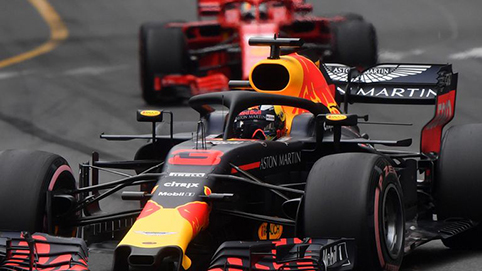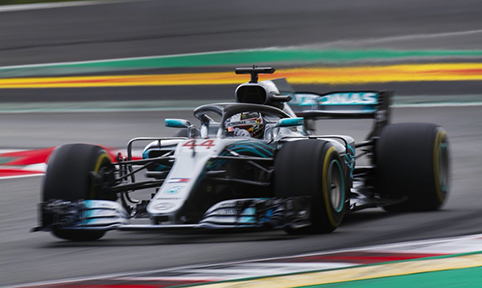Home crowd favourite Lewis Hamilton achieved his sixth British Grand Prix pole position, beating his championship rival Sebastian Vettel by 0.044 seconds.
Vettel had the edge after the first runs in the Q3 top ten shootout by 57 thousandths of a second, but Hamilton stepped up to the challenge on the second runs.
With the soft-compound Pirellis the tyre of choice through qualifying, Hamilton outpaced Vettel in the first and second sectors on the final run.
This meant Vettel’s flying final sector was not enough to reclaim P1 and left the Ferrari driver second on the starting grid.
Vettel missed his qualifying simulation during the final practice session with a neck problem, and admitted after his run that he wasn’t sure he would have been able to run in qualifying.
Vettel’s Ferrari team-mate, Kimi Raikkonen, qualified third and just 0.098 seconds off the pace after finding a three tenths improvement on his second run despite a lockup into the Turn 16 left-hander.
This followed complaining of losing his quick shift on his first run, and put him ahead of Valtteri Bottas.
Max Verstappen was fifth quickest for Red Bull, half-a-second faster than team-mate Daniel Ricciardo.
The Red Bull driver did not have the use of the DRS on his first run, which team principal Christian Horner attributed to a glitch with the system that governs when it can and cannot be used.
The problem wasn’t solved on his second run, although he was told he had manual use of the DRS provided he only activated it in the permitted zones.
Kevin Magnussen and Romain Grosjean gave Haas best-of-the-rest honours in qualifying for the second consecutive race by locking out the fourth row.
Sauber driver Charles Leclerc qualified ninth, three tenths faster than Force India’s Esteban Ocon.
Nico Hulkenberg was P11 and quickest of those who didn’t reach Q3 after lapping 0.058 seconds behind Ocon.
With very few time improvements made on the second runs in Q2, that put Force India’s Sergio Perez in P12 ahead of McLaren driver Fernando Alonso.
Toro Rosso driver Pierre Gasly was the only one of the drop zone contenders to find time on his second run, declaring himself happy he got the maximum out of the car.
This was enough to elevate him to P14 ahead of Sauber’s Marcus Ericsson, who had a relatively slow run through the final sector on his quickest lap.
Carlos Sainz was fastest of those eliminated in Q1 when he was bumped to P16 by Renault team-mate Nico Hulkenberg’s late improvement and said he lost time owing to Magnussen locking up ahead of him into Turn 3.
That put him ahead of McLaren’s Stoffel Vandoorne, who shed a piece of bodywork when he hit the inside kerb at Brooklands on his first run and ended up 0.640 seconds slower after his second attempt.
Vandoorne complained about something fundamental being wrong with the car and things not feeling right during both the morning practice session and qualifying.
Lance Stroll ended up P19 but did not set a time after spinning into the gravel at the Brooklands left-hander on his first flying lap – admitting he was “shocked” by the suddenness of the rear end snapping away.
As Stroll was unable to dig himself out of the gravel, he was forced to switch the car off and triggered a six-minute red flag while his Williams was recovered.
Brendon Hartley was unable to participate in qualifying thanks to damage sustained when he crashed at Brooklands during the final practice session.
This was caused by a front-left suspension failure, and the team must rebuild his car around a spare monocoque ahead of tomorrow’s race for him to start from the pitlane.
So a brilliant pole position for Lewis Hamilton. His 50th for Mercedes. Scoring this P1 result, right in front of his passionate fans was a magic moment. Kudos Hamilton on this achievement.
British Grand Prix, qualifying positions:
1 Lewis Hamilton Mercedes 1m25.892s
2 Sebastian Vettel Ferrari 1m25.936s
3 Kimi Raikkonen Ferrari 1m25.990s
4 Valtteri Bottas Mercedes 1m26.217s
5 Max Verstappen Red Bull-Renault 1m26.602s
6 Daniel Ricciardo Red Bull-Renault 1m27.099s
7 Kevin Magnussen Haas-Ferrari 1m27.244s 1.352s
8 Romain Grosjean Haas-Ferrari 1m27.455s 1.563s
9 Charles Leclerc Sauber-Ferrari 1m27.879s
10 Esteban Ocon Force India-Mercedes 1m28.194s
11 Nico Hulkenberg Renault 1m27.901s
12 Sergio Perez Force India-Mercedes 1m27.928s
13 Fernando Alonso McLaren-Renault 1m28.139s
14 Pierre Gasly Toro Rosso-Honda 1m28.343s
15 Marcus Ericsson Sauber-Ferrari 1m28.391s
16 Carlos Sainz Renault 1m28.456s
17 Stoffel Vandoorne McLaren-Renault 1m29.096s
18 Sergey Sirotkin Williams-Mercedes 1m29.252s
19 Lance Stroll Williams-Mercedes –
20 Brendon Hartley Toro Rosso-Honda –



















